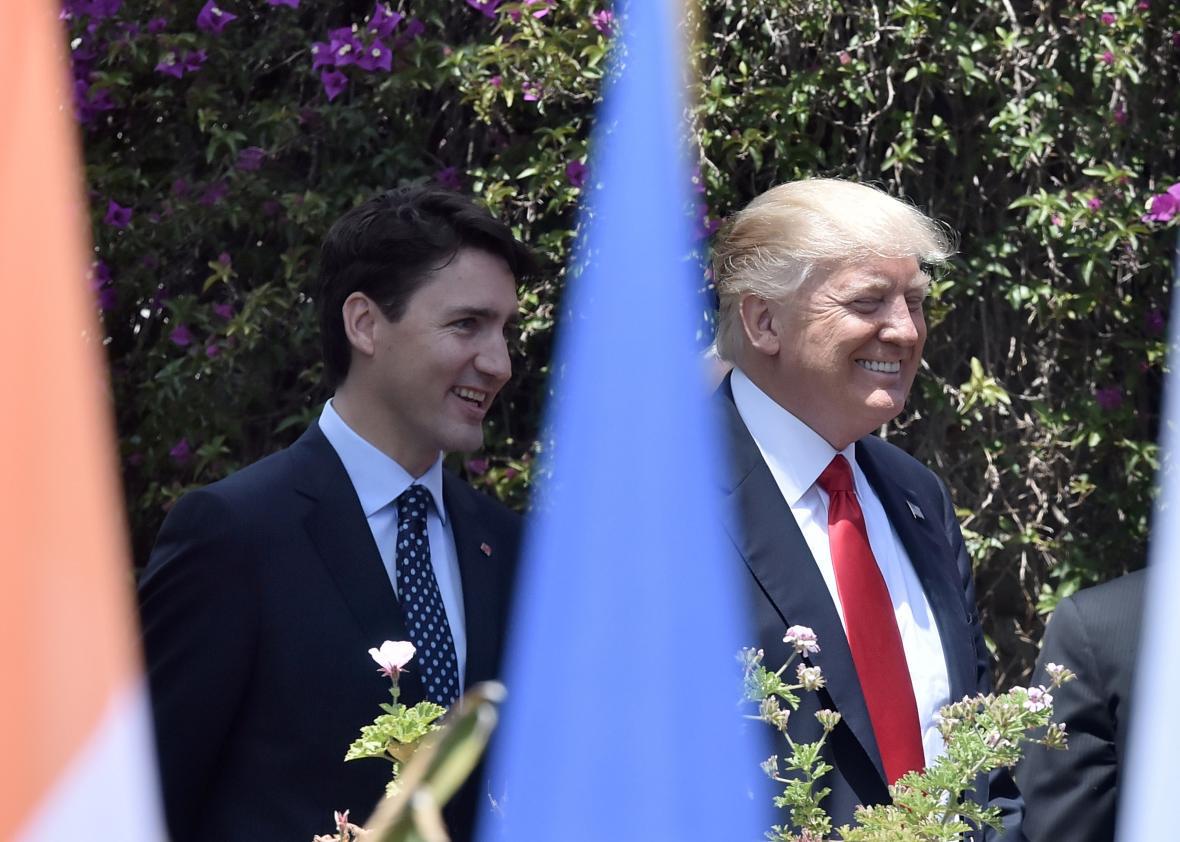Is it really possible that we’re still debating whether high-level government officials should be communicating through personal devices or servers? Apparently yes. President Trump is reportedly asking world leaders from Canada, Mexico, and France to contact him on his personal cellphone, inviting countless “Hotline Bling” and “Call Me Maybe” headlines—and of course, comparisons to Hillary Clinton’s use of personal email servers as secretary of state.
The most important detail missing from the Associated Press report is whether the personal cellphone is the same Android phone Trump was using prior to assuming office, or whether it’s now been replaced by a government-issued cellphone. In January, the New York Times reported that Trump had traded in his pre-election Android for a “secure, encrypted device approved by the Secret Service with a new number that few people possess.” But just a week later, the New York Times also reported that he was still using his “old, unsecured Android phone.”
Voice calls, like email messages, can be encrypted in transit by scrambling the signal when it leaves one receiver and travels to its destination. Much of the encryption used by default for cellphone calls is fairly weak and easily breakable, however. If he’s using his personal Android device to make diplomatic phone calls, they can easily be intercepted and spied on. But if he’s using an approved device, the phone calls will be encrypted as securely as the government can manage. The most secure form of phone communication would still probably be a landline that transmitted calls by physical wires, which would require an actual physical compromise of those connections to eavesdrop on conversations.
President Obama, the first president to use a smartphone while in office, cycled through at least three different versions of secure presidential cellphones. The first was a Sectera Edge Smartphone, designed specifically for the National Security Agency, followed by a customized version of the BlackBerry 8830 World Edition that could be used for email and unclassified calls. The last was a version of the Samsung Galaxy S4, which didn’t have a user-accessible camera. In fact, Obama couldn’t even place calls on his S4.
There is a vast difference between a government-approved cellphone and a standard commercial one when it comes to security. The Defense Information Systems Agency spends quite a bit of time and money figuring out how to create secure mobile devices for the government, and while no electronic device is perfectly secure, it’s safe to bet that the ones DISA comes up with are a good bit harder to break into than standard commercial fare. Even very basic cellphone modifications—removing cameras or unnecessary apps and software, for instance—can greatly reduce the number of ways a cellphone can be compromised.
As unsettling as it would be for U.S. antagonists (and allies) to tap Trump’s personal unsecured cellphone, there’s an even bigger worry: the possibility that that same device could be turned into a remote listening device to eavesdrop on even his in-person conversations. So if he is still relying on the same phone he used prior to the election, it’s a choice that’s hard to square with a president who has railed against leaks of sensitive information and signed an executive order ostensibly intended to strengthen government cybersecurity.
Security, of course, isn’t the only concern when it comes to using personal communication devices—there’s also the risk of evading formal record-keeping efforts under the Presidential Records Act of 1981. The AP reported that the White House did not respond to questions about whether any records would be kept of Trump’s informal conversations with world leaders.
On the bright side, the security vulnerabilities that make it possible for foreign governments and savvy hackers to intercept these calls may well counteract any attempts to keep them secret or exempt from official logs. Calls made to or from the president’s personal cellphone could be the conversations we’re likely to learn the most about, in time. Foreign governments spying on those calls may not release information about any espionage they conduct on the president’s communications, but compromising Android cellphones is not a skillset confined only to governments. Relying on commercial cell phone technology for high-level diplomatic discussions may turn out to be, in its own weird way, a reckless, irresponsible, potentially dangerous form of very radical transparency.
